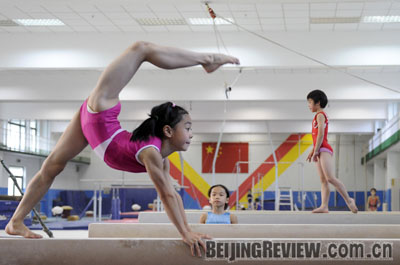|

SPORTS FINANCING: Beijing is considering securitizing its sports assets to provide
funds for their sustained operation. City authorities plan to auction the
naming rights for the National Stadium, or the Bird's Nest
The Beijing Bureau of Tourism is preparing to open the National Stadium (Bird's Nest) and the National Aquatics Center (Water Cube) to tourists during the coming National Day holiday in the first week of October.
The bureau and some major travel agencies have designed several tourist routes featuring the Bird's Nest, Water Cube, the Olympic Park and other Olympic venues. The average daily volume of tourists visiting the Olympic and Paralympic sites is expected to exceed 800,000 during the holiday, according to Zhang Lingjie, Vice General Manager of the Domestic Department of China International Travel Service Co. Ltd.
The municipal tourism bureau said because of soaring demand for group travel services in the capital city, travel agencies nationwide have increased their prices for tours to Beijing by 400 to 500 yuan ($58.8-$73.5) per person this year.
Other sectors and industries will benefit from the post-Olympics boom as well. To maintain Beijing's economic momentum, plans have been made to start a number of construction projects in transportation, energy and resources, and education, according to the Beijing Development and Reform Commission (BDRC).
"Beijing will see no large fluctuation of economic growth," said Lu Yingchuan, Deputy Director of the BDRC, at a press conference on August 21.
Economic slump?
Beijing's economy rose by an average of 12.1 percent annually from 2002 to 2007, up 1.8 percentage points over the growth rate in 2001, the year the city won its bid to stage the 2008 Olympic Games, said Chen Jian, Executive Director of the Beijing Olympic Economy Research Institute. His organization was established in November 2003, the only non-profit organization to focus on Olympic studies in China. The Olympics contributed 1 percentage point to the 1.8-percentage-point increase during this period, Chen added.
The capital's economy during the last few years has been driven mainly by investments in fixed assets such as transportation facilities and Olympic venue construction, including the Bird's Nest, Water Cube and Terminal 3 of the Beijing Capital International Airport. Investments in new communications and information technologies, living facility upgrades and eco-friendly facilities also proved to be a stimulus.
But many citizens have been asking if Beijing's economy will decelerate after the Olympics and Paralympics? Liu Wei, an economist and Dean of the School of Economics at Peking University, warned at a recent forum on the 2008 Olympic economy that there would be a post-Olympic downturn in many industries, including construction and real estate. He advised the municipal government to adjust related industrial policies to avoid huge losses and unemployment in these industries.
| 